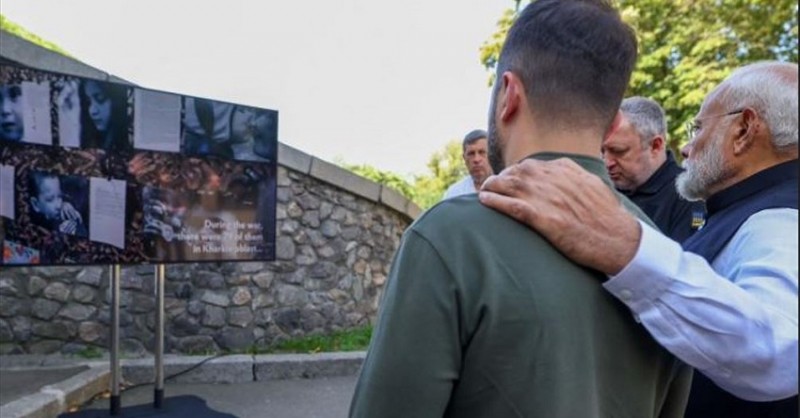
New Delhi: Amidst global turmoil, India, under the leadership of Prime Minister Narendra Modi, has emerged as a pivotal player on the world stage. Modi's recent meetings with Russian President Vladimir Putin and Ukrainian President Volodymyr Zelensky underscore this growing influence.
As the conflict between Russia and Ukraine intensifies, the international community has become increasingly polarized. While many world leaders have aligned themselves with Ukraine and condemned Russia, Modi’s diplomatic engagement with both leaders reflects India's nuanced approach to international relations, rooted in historical ties, strategic interests, and a commitment to peace.
Accusations against Ukrainian soldiers for alleged war crimes in the Kursk region have further complicated the situation. Amid this backdrop, Modi's discussions with Putin and Zelensky come at a critical moment, highlighting India's balanced stance in the conflict. Unlike the West, led by the United States, which has imposed strict sanctions on Russia and consistently supported Ukraine, India has maintained a careful neutrality.
By meeting with both leaders, Modi not only upholds India's long-standing policy of non-alignment but also reaffirms its role as a potential mediator in the conflict. This approach not only bolsters India's global reputation but also positions it to contribute meaningfully to peace efforts in this strategically crucial region.
India's relationship with Russia is steeped in history, dating back to the Cold War when the Soviet Union was a key ally, providing military aid and diplomatic support. Today, Russia remains a crucial partner for India, particularly in defense. Simultaneously, India has cultivated strong ties with the US, especially in trade, defense, and technology. This dual relationship is a testament to India's strategic autonomy, enabling it to navigate complex international dynamics independently.
Despite differing perspectives on the Ukraine conflict, Modi's ability to strengthen ties with both Russia and the US is a notable diplomatic achievement. While India continues to import crude oil from Russia, it has also expanded its defense and economic partnerships with the US. This balancing act not only protects India’s strategic interests but also showcases its ability to act independently in a multipolar world.
India’s engagement with both Russia and Ukraine has significant implications for the broader Eurasian and European regions. In Eurasia, where Russia holds significant sway, India's neutral stance ensures its role in regional security dialogues. In Europe, Modi’s outreach to Ukraine signals support for territorial integrity and sovereignty, while engagement with Russia emphasizes the importance of dialogue and diplomacy. This approach could serve as a model for other nations navigating superpower rivalries, highlighting the value of maintaining open communication channels with all parties involved.
PM Modi Holds Crucial Talks with Zelenskyy During Historic Kyiv Visit
PM Modi Visits Ukraine: Diplomatic Talks, Peace Efforts, and Trade Partnerships on Focus